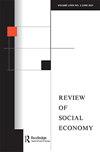‘Give me your watch and I will tell you the time’: crisis and austerity in the European Union from a Bourdieusian perspective
IF 1.6
Q2 ECONOMICS
引用次数: 0
Abstract
ABSTRACT We investigate crisis and austerity in the context of the European Union (EU) by appealing to the work of Pierre Bourdieu. Evidence suggests that after the recent US and Eurozone economic crises, fiscal consolidation intensified the deterioration of socio-economic conditions in Europe. We turn to analyses versed in the Bourdieusian tradition to explain crises and austerity in relation to the domination of the financial field and the ascendancy of neoliberal policies, processes of symbolic violence and misrecognition, and struggles for symbolic power. We then apply this framework to assess the EU economic governance system and the rhetoric imposed on Member States and social partners to justify austerity. Finally, we discuss ways to confront these conditions by presenting Bourdieu’s conception of the ‘collective intellectual’, who collaborates with other social groups in order to uncover the power relations and inequalities generated by neoliberal policies and to promote alternative economic policies for social welfare.“把手表给我,我会告诉你时间”:从布迪厄的角度看欧盟的危机和紧缩
本文通过对皮埃尔·布迪厄的研究,探讨了欧盟背景下的危机与紧缩政策。有证据表明,在最近的美国和欧元区经济危机之后,财政整顿加剧了欧洲社会经济状况的恶化。我们转向精通布尔迪乌传统的分析,以解释危机和紧缩与金融领域的统治和新自由主义政策的优势、象征性暴力和误认的过程以及象征性权力的斗争有关。然后,我们应用这个框架来评估欧盟的经济治理体系和强加给成员国和社会合作伙伴的言论,以证明紧缩是合理的。最后,我们通过提出布迪厄的“集体知识分子”概念来讨论如何面对这些条件,他们与其他社会群体合作,以揭示新自由主义政策产生的权力关系和不平等,并促进替代的社会福利经济政策。
本文章由计算机程序翻译,如有差异,请以英文原文为准。
求助全文
约1分钟内获得全文
求助全文
来源期刊

REVIEW OF SOCIAL ECONOMY
ECONOMICS-
CiteScore
2.60
自引率
10.00%
发文量
18
期刊介绍:
For over sixty-five years, the Review of Social Economy has published high-quality peer-reviewed work on the many relationships between social values and economics. The field of social economics discusses how the economy and social justice relate, and what this implies for economic theory and policy. Papers published range from conceptual work on aligning economic institutions and policies with given ethical principles, to theoretical representations of individual behaviour that allow for both self-interested and "pro-social" motives, and to original empirical work on persistent social issues such as poverty, inequality, and discrimination.
 求助内容:
求助内容: 应助结果提醒方式:
应助结果提醒方式:


